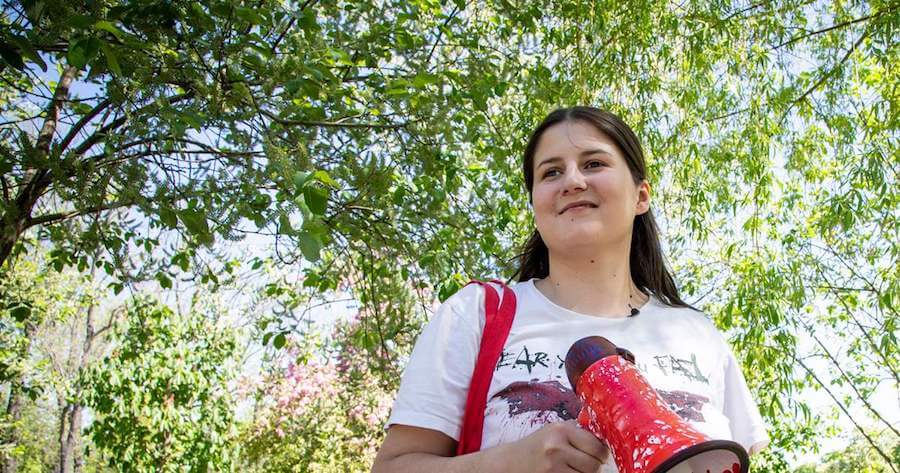Vitalina Koval couldn’t see anything. She couldn’t feel anything. She couldn’t even move.
On March 8, the 28-year-old lesbian was one of 15 people targeted by members of the far-right group “Karpatska Sich” during a demonstration held at the town square in the western Ukrainian city of Uzhgorod. In observance of International Women’s Day, local activists gathered to raise awareness about equal pay and domestic violence.
As the rally drew to a close, four women and two men doused the organizers with chemical red paint. Koval experienced severe burns on both of her eyes—temporarily blinding her.
“It was so unexpected that it almost paralyzed me,” she told INTO. “I felt a terrible pain in my eyes.”
Through the use of a translator, Koval explained that friends took her to a nearby cafe where they vigorously washed the chemicals out of her eyes, fearing she may lose her eyesight.
As her sight began to come back, Koval surveyed the destruction that had befallen what seemed just minutes before like a peaceful protest. Now spattered scarlet, the group’s protest signs had been torn to pieces. Brochures littering the wreckage warned: “Save the nation from perverse LGBTQ people.”
But months later, Koval is still seeking justice. Amnesty International notes that there has been no “effective investigation into what happened.”
“Her attackers were detained briefly but released just hours later,” the human rights organization noted earlier this year. “Afterwards, Vitalina and others received further threats, and two activists reported that they were beaten up.”
Police have been extremely reluctant to hold the assailants accountable.
The day of the attack, Koval waited in the police station for 10 hours before authorities agreed to open a case. Law enforcement agents dismissed the attack as the work of hooligans and asked her to go home. She had to threaten to stay in the station overnight before they would comply with her request.
Because she went to file a complaint directly from the hospital, Koval was still covered in red paint. Police didn’t offer her clothes to change into or even a glass of water.
The day before Koval spoke to INTO in an hour-long Skype conversation, police called to say that the case had been referred to the prosecutor’s office. It’s unclear whether the prosecutor plans to pursue the action as a hate crime or what exactly happens next.
It’s likely nothing will happen at all, Koval said.
“The far-right groups have connections in the prosecutor’s office,” she claimed. “We are afraid police will give up the hate crime charges.”
Although authorities have continued to allege the violence was a merely random act, Koval said that claim is disingenuous. Feminist groups were also attacked at last year’s International Women’s Day event by a dozen counter-protesters. When organizers complained to police, they failed to take action.
“When she inquired about the investigation a few weeks later, she received an official response that it is ongoing,” Amnesty claimed in a statement. “A few weeks later, she inquired again in writing, but to date has not received an answer.”
Koval said nationalist groups have also targeted her online.
Prior to this year’s incident, a far-right activist threatened that future actions will go even further. “Don’t you fear that next time it’s going to be the real acid and not just the paint?” read one comment left on her Facebook wall.
Acid attacks frequently lead to severe disfigurement and sometimes death. They have become increasingly common in recent years.
Fearing for her life, Koval left Uzhgorod following the attacks. Although she briefly returned to the city of her birth, the feminist organizer was forced to relocate to the Ukrainian capital of Kiev because of safety concerns.
While Amnesty works to lobby the Uzhgorod police to prosecute the case as a hate crime, Koval is focusing on the positive.
Her mother recently called and said she’s “proud” of her daughter. Koval said she hung up the phone and immediately started crying; it meant that after years of struggling for acceptance in her family, she was finally being embraced for who she is.
“It took a long time to get acceptance from my family—about 10 years,” Koval explained.
When she first attempted to come out to her parents, her mother claimed she would “kill herself” if her daughter were a lesbian. Koval stayed in the closet for years, parading a series of fake boyfriends around her family to keep up appearances. She even considered marrying a gay friend.
But when she turned 25, Koval realized she was “exhausted from lying.”
“When I was getting back home from my birthday party, I had a serious conversation with myself,” she remembered. “My parents told me to always be honest and speak the truth, but I didn’t know how. It was a heavy burden on my shoulders. I realized that I wasn’t living my own life.”
“At that moment, I decided to tell my parents who I am,” Koval added.
Koval said that her parents’ support for her LGBTQ activism and advocacy for women’s rights shows how far they’ve come. Despite the challenges in fighting for equality in a country which remains widely conservative, her goal is to make things a little bit easier for the next generation of feminists and queer people.
“I understand that we have a lot of work to do our society,” she said. “This is my main motivation—to wake up in an open-minded society where everyone can be happy and be themselves.”
Note: Quotes have been edited and condensed for clarity.
Don't forget to share:
Help make sure LGBTQ+ stories are being told...
We can't rely on mainstream media to tell our stories. That's why we don't lock our articles behind a paywall. Will you support our mission with a contribution today?
Cancel anytime · Proudly LGBTQ+ owned and operated
Read More in Impact
The Latest on INTO
Subscribe to get a twice-weekly dose of queer news, updates, and insights from the INTO team.
in Your Inbox













